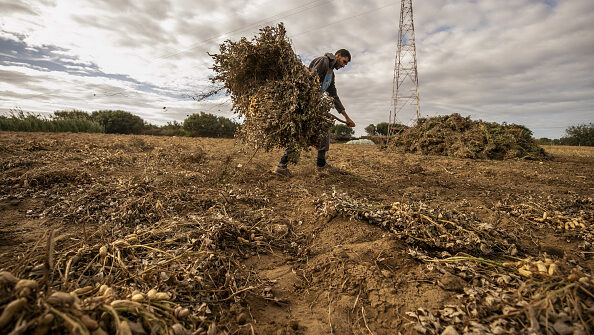Experts Advocate for Tunisian Food Sovereignty as a Path to Independence
Food sovereignty has become a high priority among local NGOs, civil society and the government to protect against foreign investments that that may steal land from local farmers
In 1996, a global movement of farmers called La Via Campesina coined the term “food sovereignty” to describe a powerful and innovative concept and vision of a better food future.
They defined food sovereignty as “the right of peoples to healthy and culturally appropriate food produced through ecologically sound and sustainable methods, and their right to define their own food and agriculture systems.”
While “food security” is another widely used term today, it differs from the concept of food sovereignty.
“Food security doesn’t imply where the food is taken from and doesn’t take into consideration any power balance,” Aymen Amayed, a researcher at the Arab Reform Initiative and an agronomist and political activist within Tunisian civil society, told The Media Line.
Regarding domestic food production, Tunisia is not self-sufficient. In fact, more than 50% of the food consumed within the country is imported from abroad. This is although Tunisia produces food for export to foreign countries, such as olive oil, dates, and strawberries.
“We are producing too much food for export, and this costs a lot in terms of local workforce and water supplies,” said Amayed, who emphasized that climate change has created even more water shortages, worsening the already problematic situation.
In addition to the many agricultural products being imported, such as seeds and fertilizers, local food has also been subjected to price pressure and fluctuations related to currency exchange rates.
A more concerning unintended consequence of all the imports of hybrid seeds and tree seedlings is that the country’s rich bio-genetic heritage is gradually disappearing. In addition, local farmers find themselves at the mercy of pesticide sellers.
“The Tunisian farmer can produce his own seeds, but he can not sell them. Most of the seeds are imported, along with the technology used to produce them. Local seeds do not fit into a specific catalog, which is done on purpose to use only the hybrid ones,” Habib Ayeb, a researcher and geographer at the University of Paris 8 in Saint-Denis, told The Media Line.
“Food sovereignty is fundamental to end the circle of a new ‘colonial economy’ that still ties Tunisia not only to France, its historical colonial power but to every European country. Despite our national independence, we are still not overall free,” added Ayeb, who is also a filmmaker and co-founder of Observatoire de la Souverainetè Alimentaire et de l’Environnement
“Using local farmers is a way out of a growing intensive agricultural industry and confiscation of land used mainly for foreign production,” he added.
The issue of food sovereignty in Tunisia has become a high priority, not only among local NGOs and civil society but also among government officials, who are trying, step by step, to protect the country by imposing taxes and legal obstacles for foreigners. Their efforts are an attempt to diminish massive foreign investments that may steal land from local farmers.
“President Saied is not talking directly about new policies, but we see more regional and local authorities engaging in this topic, acknowledging the importance of local production,” added Amayed.
Tunisia is among the North African countries that are playing an increasingly pivotal role in protecting local farmers and their seeds. While concerted efforts are being made through the state-owned Bank of Seeds, the path to full food sovereignty is still a long one.
“Our neighboring countries are facing more challenges in the path of food sovereignty because of their political regimes and their laws that facilitated foreign capital investments and land exploitation. Morocco is a clear example of this phenomenon,” he explained further.
Tunisia’s struggle for food sovereignty is intertwined with the Boycott, Divestment, and Sanctions (BDS) movement in other Arab countries, according to Amayed. “Almost 100% of the activists and NGO members [in Tunisia] are part of the [global] BDS campaign. It is a matter of land rights and of fighting against imperialism. We also cooperate with activists and small farmers’ groups in Palestine,” he said.
“The Palestinian struggle is our main struggle at the moment. Food is a personal choice, and not consuming certain products has a clear impact,” Amayed concluded.


